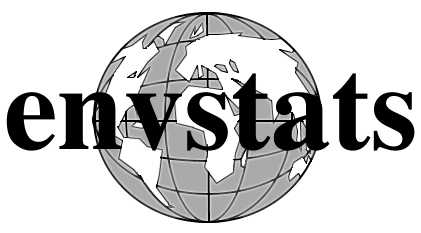 |
 |

NEWS
from the
United Nations Statistics Division (UNSD)
Issue
8
January 2000 - July 2000
EDITORIAL

Is it possible to
construct a single index measuring environmental sustainability? In its
present issue Envstats invites participants of an exploratory effort to
report about their approach to measure the ability of economies to achieve
environmentally sustainable development.
The
Pilot Environmental Sustainability Index
by
Alex de Sherbinin and Marc A. Levy
Center for International Earth Science Information Network (CIESIN)
Columbia University
The quest for an index of environmental
sustainability - a composite measure that can summarize environmental
performance along multiple axes and that can aid decision makers in choosing
the best policies for both the environment and the economy - has intensified
in recent years. Several efforts have been directed to develop comprehensive
lists of indicators monitoring national or sub-national environmental
performance. Although these have been notable for their broad consultative
processes and for identifying critical indicators utilizing the best available
scientific understanding, none to date has produced quantitative measures
of environmental sustainability that permit comparative analysis of the
levels and determinants of sustainability among countries.
Recognizing an opportunity to
contribute in this area, last year CIESIN participated in an effort of
the World Economic Forum, along with the Yale Center for Environmental
Law and Policy, to develop a working prototype of an Environmental Sustainability
Index (ESI). This brief overview describes the steps we took to develop
the pilot Index, and identifies the next steps for refining the methodology
and improving the data sets upon which the ESI is based.
The ESI is based loosely on the pressure-state-response framework, but
with some important distinguishing features. The five discrete components
that make up the ESI - environmental systems, environmental stresses,
human vulnerability to environmental impacts, social & institutional capacity,
and global stewardship - were derived from careful study of the elements
that comprise environmental sustainability and a review of recent scholarship.
The emphasis on elements of capacity, vulnerability and global stewardship,
which are commonly missing in collections of environmental indicators,
reflects our conclusion that these factors are integral to the concept
of environmental sustainability. The five components, in turn, are composed
of between two to six factors each, grouping together measures such as
air quality, water quality, biodiversity loss, land degradation, waste
production, disasters exposure, technical capacity, environmental regulation,
eco-efficiency, and contributions to international environmental cooperation.
A total of 65 variables are distributed among 21 factors. To calculate
the pilot Index, countries were scored on a 0 (low sustainability) to
100 (high sustainability) scale based on where they fell in the range
for any particular variable. These variable scores were then averaged
to produce factor scores, and the factor scores in turn were averaged
to produce the ESI.
An important constraint in the development of the pilot ESI was the availability
of comprehensive and reliable global data sets. Many important variables
could not be included in the calculations because the data are simply
nonexistent or of questionable quality. Other indicators presented problems
because their country coverage is highly limited. The fact that so few
global data sets exist for so many of the world's most pressing environmental
issues is a shocking indictment of our current system. We think that it
constitutes one of the major impediments both to solid understanding of
environmental conditions and to more effective policymaking. We are trying
to work around this shortcoming in our current work. For example, we plan
to draw upon regional or national data sets for variables with insufficient
coverage, and to circumvent the data availability impasse through the
utilization of data derived from global modeling exercises.
For the pilot phase we relied heavily on commonly used global data sets.
This had many advantages, insofar as the data were readily accessible
and in tabular formats with good country coverage. However, there were
drawbacks as well. As we delve more into each data set and talk with the
original compilers of the data, we have come to a better appreciation
of each data set's strengths and limitations. We have concluded from this
that we should seek to use original sources wherever possible.
Methodologically, we plan to use improved statistical techniques (e.g.,
principal components and factor analysis) and to identify if there are
scientifically defensible thresholds and weighting schemes that should
be applied to the indicators we use. We are also developing an interactive
version of the index that will allow users to apply different weightings
to variables and factors based on their own priorities and values.
Despite the data limitations, we have received positive responses to the
pilot ESI from scholars, government officials, and environmental activists.
Still, it is clear that more can be done. It is our hope that the ESI
will spur national statistical agencies to take more seriously the collection,
analysis and dissemination of environmental data. Otherwise, the world's
policy makers will be navigating with incomplete, and possibly inaccurate,
road maps. (For more details go to: http://www.ciesin.columbia.edu/indicators/ESI/pilot_esi.html.)
WHAT?

Millennium
Report.
In April 2000 the Secretary-General released his Millennium Report, in
which he identifies pressing challenges faced by the world's peoples and
proposes a number of priorities for Member States to consider at the Millennium
Summit. In this context the Secretary-General recognizes the importance
of environmental accounting in economic policy making and suggests its
serious consideration by the Millennium Summit. The following is a quote
from Chapter V. "Sustaining our future" of the Report.
".the
environment must become better integrated into mainstream economic policy.
The surest way to achieve that goal is to modify systems of national accounts
so that they begin to reflect true environmental costs and benefits -
to move towards "green" accounting. .The System of Integrated Environmental
and Economic Accounting, pioneered by the United Nations in 1993, is a
response to this challenge. .Although this system of green accounting
is still a work in progress, it is already employed by national governments.
.I encourage governments to consider this system of green accounting carefully
and identify ways to incorporate it into their own national accounts."
Thirty-first
Session of the Statistical Commission (New York, 29 February-3 March
2000). The Statistical Commission approved the proposed consultation process
and schedule of activities for the revision of the System of Integrated
Environmental and Economic Accounting and recommended that the handbook
on integrated environmental and economic accounting be submitted to the
Statistical Commission for its approval at its thirty-second session in
2001.
UNSD/CARICOM
project. The United Nations Statistics Division (UNSD) is organizing
a Workshop on Environment Statistics for CARICOM Member Countries co-hosted
by the Central Statistical Office of Belize. The Workshop will be held
in San Ignacio, Belize from 2 to 11 August 2000. The Workshop is part
of the project "Strengthening Capacity in the Compilation of Statistics
and Indicators for Conference Follow-up in the CARICOM Region" whose Implementation
Plan was endorsed by the Standing Committee of Caribbean Statisticians
(SCCS) at its meeting in Georgetown, Guyana 10-13 January 2000.
The main objective of the Workshop is to familiarize participants with
concepts and methods of environmental statistics and indicators and to
promote a regional environment statistics programme. It will also provide
a forum for exchange of information on the status of environment statistics
at the national level. The outline of a regional publication on environment
statistics will also be developed during the Workshop.
One of the outputs of the Project will be the publication of an analytical
report on environment statistics based on data supplied by countries.
The participants in the Workshop will form a network of experts that will
collaborate with UNSD and CARICOM in the compilation of statistics and
indicators relevant to the region.
News from
the regional commissions
Sub-regional Training Workshops on Environment Statistics for countries
in Asia and the Pacific
(by Selma Guven and Andrew Flatt, Statistics Division, ESCAP).The Statistics
Division of ESCAP, with the support of the Government of the Netherlands,
is running a project that focuses on organizing a series of sub-regional
training workshops on environment statistics in the region. The broad
aim of the project is to improve national capabilities of the region's
developing countries for identifying, collecting, processing, analysing
and disseminating the data needed for formulating policies and programmes
for environment and sustainable development, as well as for monitoring
and evaluating the progress made.
The workshops
are targeted at senior/middle level officials who are or will be directly
involved in environment statistics or a closely related field, both from
the national statistical agency and from the nodal department/agency dealing
with environmental concerns. Participants are exposed to recent developments
and methodological issues in the fields of environment statistics, indicators
and accounting including definitions, classifications, survey and estimation
methodologies, and data sources. They review the progress made in the
countries/areas of the region in the field of environment statistics and
share their experiences of issues encountered and strategies adopted to
overcome some of the obstacles faced. The programme consists of four thematic
modules, starting with a general introduction to the basics of environment
statistics and its relation to indicators and accounting. The second module
focuses on environmental pollution and environmental quality including
air, water, and waste. The third module covers issues of ; land use, biodiversity
and soil degradation as well as the use of remote sensing and geographical
information systems, while the last module gives a brief overview of approaches
to environmental accounting.
The first workshop was held in Bangkok from 8 to 19 May 2000. The thirty-one
participants came from fifteen countries and areas in East and South East
Asia. Under the current project, three more sub-regional workshops on
environment statistics are being planned, for South Asian countries in
late 2000, for Central Asian countries and Pacific Islands developing
countries in 2001. (Additional information is available on the website
of the Statistics Division: http://www.unescap.org/stat.)
WHO?

Ms. Alessandra
Alfieri has been
on sabbatical leave since February. During this period she has been completing
her thesis for a Ph.D while continuing to work on the SEEA revision process.
Ms. Ilaria DiMatteo joined the Environment Statistics Section in
May as an associate statistician to work on environmental accounting.
She attended the University of Rome "La Sapienza" where she obtained a
Doctorate in Statistical Methodology. She spent the last 5 years at Carnegie
Mellon University, Pittsburgh, Pennsylvania working towards her PhD. Degree
which she expects to complete this year.
Ms. Tanja Srebotnjak joined the Environment Statistics Section
as associate statistician in April to work on environmental statistics
and indicators. She studied Statistics and Theoretical Medicine at Dortmund
University (Germany) and The University of Auckland (New Zealand) from
which she graduated with a Diploma and Master of Science in 2000. In her
studies she focused on epidemiological models for analyzing survival time
data. She is particularly interested in environmental performance indices
and exploring the effects of environmental degradation on human health
and quality of life.
Within the framework of the United Nations Internship Programme, Mr.
Ayaz Asif from the Blaise Pascal University, France, assisted UNSD
from January to March 2000 with processing of data received from the UNSD
Questionnaire on Environmental Indicators and doing library research.
Ms. Ines Hambach from the University of Karlsruhe, Germany, assisted
UNSD from June to August 2000 in its work on environmental statistics
and indicators, in particular in the preparation of technical background
material for the UNSD/CARICOM project.
About the authors
Mr. Andrew Flatt has worked for the United Nations in the field
of statistics for many years. He is currently the Director of the ESCAP
Statistics Division.
Ms. Selma Guven has been working as Statistician for environment
and poverty statistics in the Statistics Division of the Economic and
Social Commission for Asia and the Pacific of the United Nations (ESCAP)
since October, 1999. Before joining ESCAP, she was the Head of Environment
Statistics Division in the State Institute of Statistics in Turkey.
Alex de Sherbinin recently joined CIESIN as a Research Associate.
He has held previous positions at IUCN-The World Conservation Union and
the Population Reference Bureau.
Mr. Marc Levy is Director of CIESIN's Science Applications Division.
He has taught at the Woodrow Wilson School of International Affairs at
Princeton University and at Williams College, and has written widely on
international environmental affairs.
WHEN
AND WHERE?

Meeting
on Valuation, Chapter 5 of the SEEA-2000
(Milan, 4 March 2000). Selected members of the London Group met in Milan
to discuss outstanding issues in Chapter 5. The subgroup discussed open
questions and identified action points. The meeting was convened in connection
with the workshop "Green National Accounting in Europe: Comparison of
Methods and Experiences" (Milan, 5-7 March 2000), organized by the Fondazione
ENI Enrico Mattei as part of the Concerted Action on Environmental Valuation
in Europe (EVE).
Consultative Group to Identify Themes and Core Indicators of Sustainable
Development (New York, 6-9 March 2000). The Group, convened by the
UN Division of Sustainable Development, identified and finalized key themes
and sub-themes of sustainable development to be included in the presentation
to the ninth session of the CSD and identified core indicators related
to the above-referenced themes and sub-themes. UNSD was one of the five
members of the Consultative Group.
Statistics for Environmental Policy (Munich, 23 March to 28 June
2000). The Munich Centre for Economic, Environmental and Social Statistics
organized this course for ACP countries and China. Participants were from
national statistical services and from national environmental institutions
or ministries. UNSD provided a resource person from 6 to 10 April 2000
to present the subject "Environmental Statistics and Indicators" as part
of the three and a half month course.
Meeting of the London Group Coordinating Committee (Washington
DC, 10-12 April 2000). UNSD attended the meeting of the London Group Coordinating
Committee hosted by the World Bank. Members of the Coordinating Committee
include in addition to UNSD, OECD, Eurostat and the World Bank, the Australian
Bureau of Statistics and Statistics Netherlands. The Committee reviewed
the draft Chapters of the SEEA-2000 and discussed the SEEA revision process.
Chapters 1-4 have been posted on the London Group web page http://ww2.statcan.ca/citygrp/london/london.htm.
The remaining two chapters will be posted on the same web page shortly.
Institutional Strengthening
and Collection of Environment Statistics (Phase 2) - Inception Workshop
(Samarkand, Uzbekistan, 25-28 April 2000). The Asian Development Bank
organized the workshop as part of its Regional Technical Assistance covering
five developing member countries, namely Kazakhstan, Kyrgyzstan, Mongolia,
Tajikistan and Uzbekistan. UNSD presented a paper that described various
international frameworks on environmental statistics and indicators, in
particular the FDES, and provided a comparison between them.
Workshop on Environmental and Natural Resources Accounting (Pretoria,
South Africa, 5-8 June 2000). The workshop was organized jointly by UNSD,
the Natural Resource Accounting in Southern Africa project (funded by
USAID Regional Center for Southern Africa) and the Resource Accounting
Network for Eastern and Southern Africa (funded by the Swedish International
Development Agency). The Workshop provided hands-on training on the compilation
of environmental accounting. Selected modules of the SEEA-2000 were presented
and discussed. Participants included representatives from the national
governments, academia and private sector.
Forthcoming
IARIW 2000 (Cracow, Poland, 27 August-2 September). A session devoted
to the SEEA 2000 is planned for the 26th General Conference of the International
Association for Research in Income and Wealth. Three discussants will
introduce comments on the draft chapters and, after floor discussions,
several authors of the draft will respond to the comments. UNSD will participate
in the meeting.
International Workshop on Environmental-Economic Accounting (Manila,
Philippines, 18-22 September 2000). UNSD, UNDP and the National Statistical
Coordination Board of the Philippines will jointly organize the Workshop
that is one of the activities envisaged in a project on strengthening
regional capacities for statistical development in the ASEAN region. Its
objectives are to: (a) train the participants on the SEEA implementation;
(b) provide a forum for the exchange of information among countries in
the region on environmental accounting compilation; (c) discuss draft
chapters of the SEEA-2000; (d) assess the status of implementation of
environmental accounting in the region.
Seventh Meeting of the London Group on Environmental Accounting (Voorburg,
Netherlands) that was originally planned to be held 16-23 October has
been postponed to March - April 2001. The Group will review a first complete
draft of the SEEA-2000.
POINT
OF VIEW?

Note of
the Editor
With the "Point of View" column, Envstats would like to provide
a forum for discussion about hot and/or controversial issues in environment
statistics. We invite you to air your individual thoughts and ideas on
this page. Your comments on the role of environment statistics and that
of the UNSD is also solicited and appreciated. Please send them to the
address below.
|
envstats
is produced by the Environment Statistics Section of the United
Nations Statistics Division (UNSD). The views expressed here do
not necessarily reflect those of the United Nations. Comments and
contributions for inclusion in future issues should be sent to Kathleen
Suite, envstats, DC2 - 1638, 2 United Nations Plaza,
New York, New York 10017.
Tel: (1-212) 963 4847. Fax: (1-212) 963 0623.
E-mail: envstats@un.org.
|
United Nations Statistics Division - Environment Statistics, envstats -
issue7
|
 |







